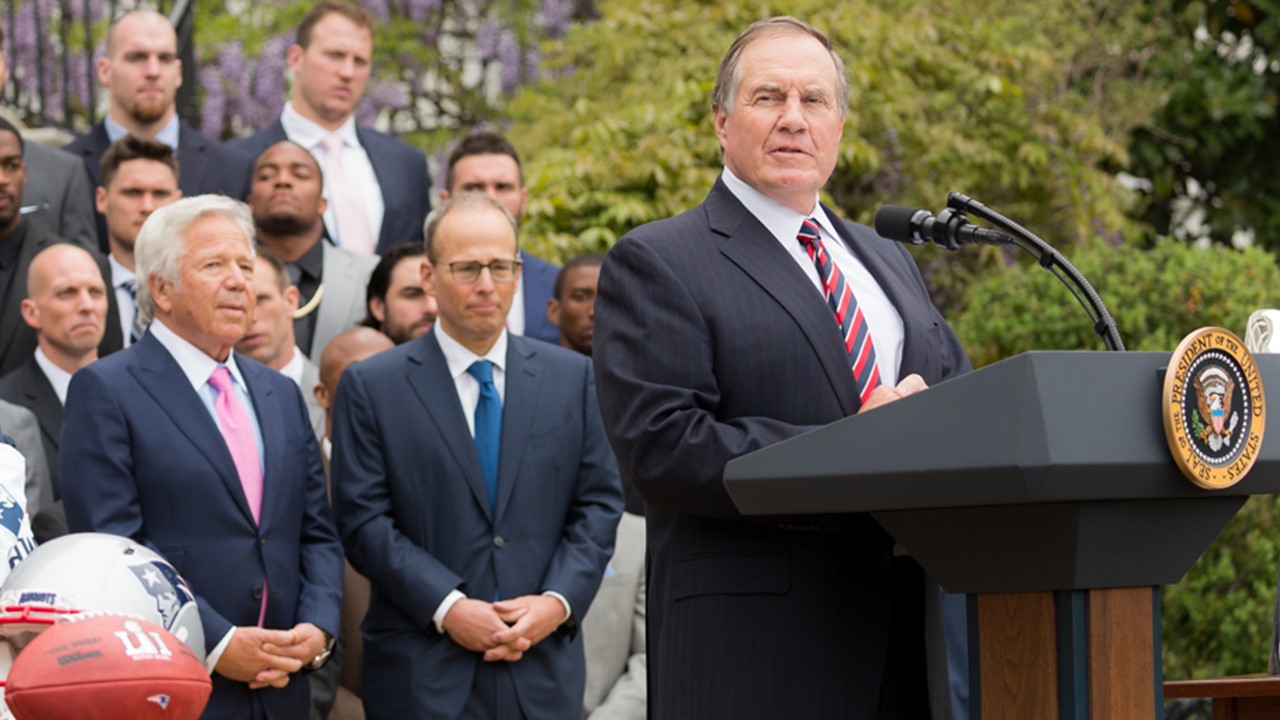
New England Patriots Coach Bill Belichick delivers remarks during the team’s visit to the White House celebrating their Super Bowl LI victory on the South Lawn, Wednesday, April 19, 2017. (Official White House Photo by Shealah Craighead).
In the book Parcells: A Football Life by Bill Parcells and Nunyo Demasio, you learn how back in 2007, Atlanta Falcons owner Arthur Blank almost landed the Big Tuna as vice president of football operations. Meeting at Parcells’s home in Saratoga Springs it was quite the sequence with Blank in Parcells’s library cooling his heels while Bill was fielding calls from the Dolphins for a similar position. Blank lost out and was not pleased about it. Will he now get Parcells’s protégé Belichick?
Boston Globe columnist Dan Shaughnessy recently talked with Parcells about Belichick. Before I get into that, I wrote to you about Shaughnessy last year. Here it is:
“Forty years ago. After getting out of bed, I jogged a mile on the streets of LA to make my 29-year-old self feel better,” begins Dan Shaughnessy, long-time sports columnist for The Boston Globe. “And I never stopped. One mile a day. A four-decade, slow-motion grind that has taken me more than 14,500 miles, across America and back — twice! Practically Gumpish.”
Shaughnessy writes of Parcells:
Bill Parcells, now 81, is a Hall of Fame coach who won two Super Bowls with the Giants, then changed the culture of the Patriots when he came to New England in 1993. After four seasons and a trip to the Super Bowl with the Patriots, Parcells coached the Jets and Cowboys, then retired from the sideline at the age of 65.
The Tuna knows what it’s like to work for Bob and Jonathan Kraft, and he knows what it’s like to take on a new team late in his coaching life.
When I reached him on the phone this past week, Parcells was careful not to say too much about what went down in New England or what might happen with Bill Belichick.
Be the first to know the latest sports news as it happens, and get the Globe’s most interesting reporting right to your inbox.
“I’m like Sergeant Schultz,” he said. “I know nothing.”
Parcells and Belichick go all the way back to 1979 when the two first worked for Giants head coach Ray Perkins.
“Bill was a special teams coach,” remembered Parcells. “My desk was in the same office as his, and you could tell he was a hard-working guy and liked football. So I asked Ray if I could have him just start to help us out on defense. And that’s how it all started. Bill was a good resource and he learned the defense and eventually became a coordinator and onward and upward.
“Coaching can be a narcotic for guys like us. I can put Pete Carroll and Bill in there. We view ourselves as coaches. It can be a grind, and the older you get, sometimes the grind gets greater, but we love the game.
“You still got to do it the way you know it should be done. And knowing Bill so well, I’m sure he did it exactly like that. I’m sure Pete did, too. That doesn’t mean it’s any less of a task, but as you get older, it takes a little more.
“I don’t feel like it ever beat me down. After a while, you know it’s going to end sometime, but it’s never a good time.”
Any advice for Belichick, who has already interviewed with the Falcons (according to reports, a second interview is happening this weekend), but won’t be going to Dallas now that Jerry Jones is sticking with Mike McCarthy?
“I wouldn’t give him any advice, I really wouldn’t,” said Parcells. “He’s been around long enough to know what he wants to do, and I really don’t have any idea what that is. All I know is, he’s a football lifer and he’s shown that.
“I’m pretty sure if he wants to coach again, he’ll be looking for a situation that he thinks is conducive to winning. In this business, it’s either euphoria or disaster. I hope he does whatever makes him happy.”
There will be no predictions from the Tuna — just statements on the realities of coaching in the NFL.
“When you’re a head coach, there’s always something every day,” he said. “I used to tell our guys who were going off to be head coaches, ‘There’ll be five things happening every day that you wish wouldn’t happen. If you can’t deal with that, you’d better get another job.’ And that’s the truth.
“I never didn’t like the game. I still like it. I watched all last weekend and this weekend. I’ve got four guys that either played or coached for me coaching against each other in the Tampa-Detroit game. Todd Bowles [Buccaneers head coach] worked for me in Dallas and Kacy Rodgers [Buccaneers defensive line coach], I brought him into the league. And now they’re playing Dan Campbell [Lions head coach] and Aaron Glenn [Lions defensive coordinator], who were my players.”
The Tuna likes passionate football towns. In Dallas, fans go to high school games and college games and football is important, but that’s not really reflected in the NFL team’s fan base. The passion is not like Philadelphia, New York, Pittsburgh, Cleveland, Green Bay, or New England.
“Boston’s a great sports town,” said Parcells. “They like their hockey, basketball, baseball. They like everything. You couldn’t be a coach in a better place. Nothing lasts forever, but what Bill and the Patriots did there in New England was remarkable.”
And let’s not forget about 2017:
P.S. This is a great part from the book:
He is called “Coach.” It is a difficult job, and there is no clear way to succeed in it. One cannot copy another who is a winner, for there seems to be some subtle, secret chemistry of personality that enables a person to lead successfully, and no one really knows what it is. Those who have succeeded and those who have failed represent all kinds—young and old, inexperienced and experienced, hard and soft, tough and gentle, good-natured and foul-tempered, proud and profane, articulate and inarticulate, even dedicated and casual. Most are dedicated, some more than others. Some are smarter than others, but intelligence is not enough. All want to win, but some want to win more than others, and just wanting to win is not enough in any event. Even winning is often not enough. Losers almost always get fired, but winners get fired, too.
He is out in the open being judged publicly almost every day or night for six, seven, or eight months a year by those who may or may not be qualified to judge him. And every victory and every defeat is recorded constantly in print or on the air and periodically totaled up.
The coach has no place to hide. He cannot just let the job go for a while or do a bad job and assume no one will notice as most of us can. He cannot satisfy everyone. Seldom can he even satisfy very many. Rarely can he even satisfy himself. If he wins once, he must win the next time, too.
Coaches plot victories, suffer defeats, and endure criticism from within and without. They neglect their families, travel endlessly, and live alone in a spotlight surrounded by others. Theirs may be the worst profession—unreasonably demanding and insecure and full of unrelenting pressures. Why do they put up with it? Why do they do it? Having seen them hired and hailed as geniuses at gaudy, partylike press conferences and having seen them fired with pat phrases such as “fool” or “incompetent,” I have wondered about them. Having seen them exultant in victory and depressed by defeat, I have sympathized with them. Having seen some broken by the job and others die from it, one is moved to admire them and to hope that someday the world will learn to understand them.”
E.J. Smith - Your Survival Guy
Latest posts by E.J. Smith - Your Survival Guy (see all)
- The Grid Pushed to Its Limits - May 8, 2024
- How Will America Fill Its Data Center Power Gap? - May 8, 2024
- Which States Tax Social Security? - May 8, 2024
- The People’s Chemist and Your Survival Guy - May 7, 2024
- RIP Charlie Munger: Keeping It Simple Never Goes out of Style - May 7, 2024















